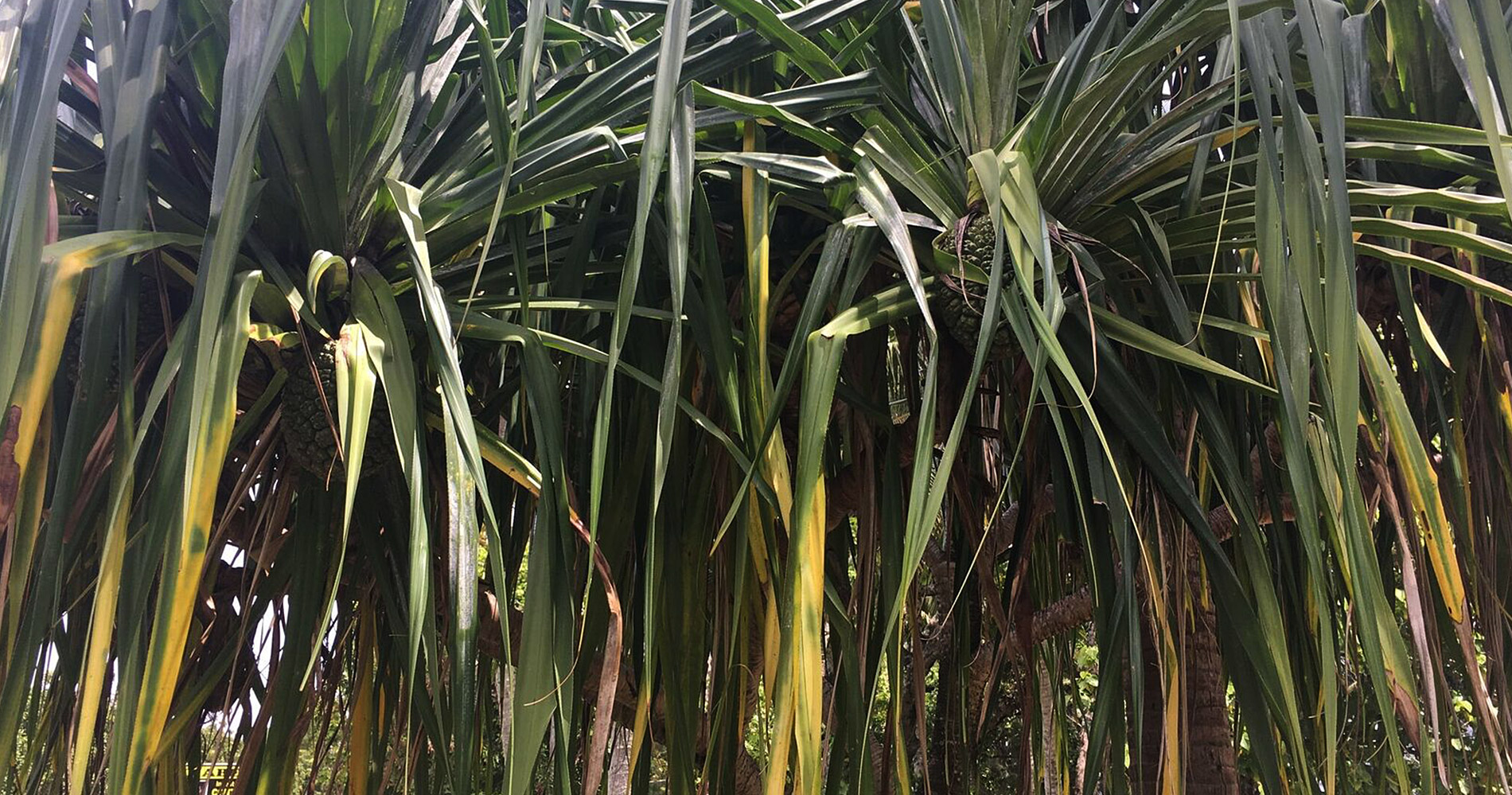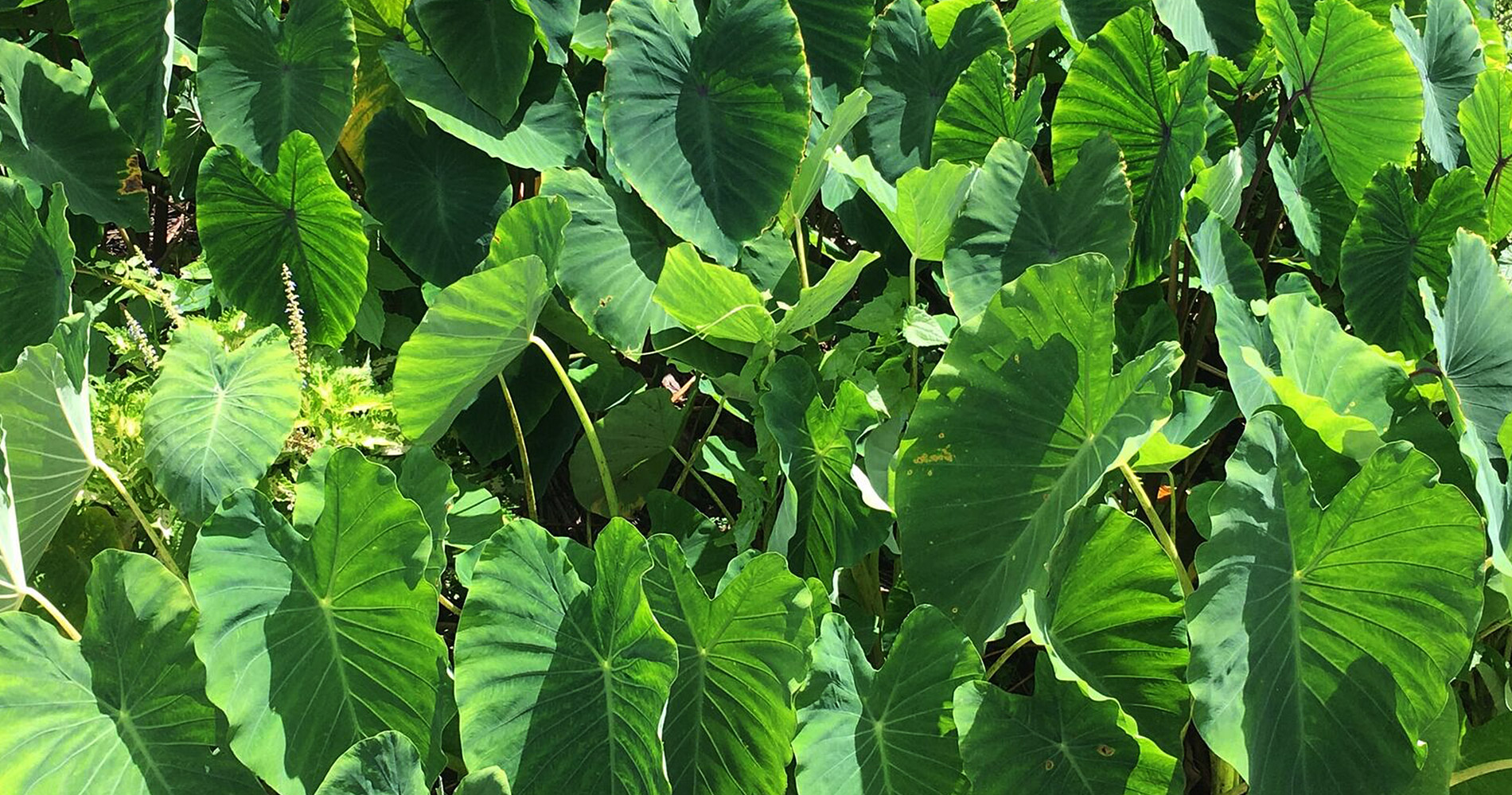peru Pronunciation
1. Comb. Kua 'ākara 'aia ki roto i te i'o 'akaata i tōna peru'anga i tōna rauru. He combed his hair in the mirror. Perua tō‘ou rauru kia vave. Hurry up and comb your hair. Kua ‘oko peru mai au. I’ve bought a comb.
2. Prepare, collect, forage for food. Kua ‘aere rātou peru kai. They’ve gone to prepare food.
3. A large roughly-woven coconut-leaf basket (Mang. Dial. Cf. Rar. Tāpora). Kāvea mai tēnā peru tōmāti. Bring over that basket of tomatoes. Kua 'a'ao te ravākai i tāna au 'apinga ki roto i te peru. The fisherman put his tackle in the creel.
Peru
1. (loc.n.) The name of the country of Peru, in South America .
2. (n.) Rapidly made, loosely woven coconut basket .
pateka Pronunciation
1. (v.i.) Slip, slide easily; smooth, slippery, sleek (of hair). Kua pateka 'aia ki raro mei runga i te toka. He slipped down off the rock; 'Auraka e 'eke nā kona, e ngā'i pateka tēnā. Don’t get down that way, it is slippery there; E pateka ngō'ie 'ua ana te pi'a kaingākai. Te table drawer slides easily; E a'u pateka koe i tēia rākau. Plane this timber down smooth; E peru koe i tō'ou rauru kia pateka meitaki.Comb your hair nice and slick. (See 'akapateka, tāpateka, ('aka-tā-)pātekateka.) .
vā‘i Pronunciation
1. Split (tr.) apart, divide, open (door, discussion, meeting), break in or open, cut (cards), part (hair), operate. I‘m going to break open this box; Kua vā‘i au i te ‘anga‘anga ‘ē toru tu‘anga. I’ve divided up the work into three lots; Vā‘ia te pā kia tomo mai ‘aia. Open the door and let him in; E tū koe ki runga ē vā‘i i te tuatua. You get up and open the discussion; Kua vā‘i aia i te pere. He cut the cards; E vā‘i koe i tō‘ou rauru mē peru koe. Put a parting in your hair when you comb it; Kāre e meitaki tēia maki kia vao‘o pērā ‘ua, ka vā‘i roa. It is no good leaving the disease to go on like that, there will have to be an operation.
2. Break (tr.), shatter. Kua vā‘i ‘aia i te mō‘ina ki runga i te toka. He smashed the bottle against the stone.
3. Vā‘i (pere). Read cards, tell fortunes. Pass the cards and I‘ll tell your fortune. 'Ōmai i te pere kia vā'i au iā koe. [Pn. *fasi.].
vanavana Pronunciation
1. Come up in goose flesh. Kua vanavana tōna pākiri nō tōna mataku. His skin came up in goose flesh from fear.
2. Bristle, stand on end, stick up, (of hair, rauru, ‘uru); bristling. That dog has bristling hair; I te vanavana‘anga tōna rauru, kua tāmā‘ū ‘aia ki te vai ē kua peru. When his hair kept sticking up, he damped it down and combed it.
kōperu Pronunciation
1. (n.) A fish, mackerel scad (Decapterus macarellus). 'E kōperu ota tā mātou i kai ei. We had raw kōperu to eat; Kua 'oko'ia te kōperu mama'ata 'ē rima tirīngi i te tui. The larger kōperu were sold for five shillings a string. [Ce. *koo-peru.] .
kutu Pronunciation
1. (n.) Louse. Nō te mangiō i te kakati a te kutu, kua ūkīkī te puaka i tōna kōpapa ki runga i te tumu rākau. The pig rubbed its body against the tree-trunk because the lice bites were itching; 'E punu paura kutu tāku i 'oko mai ei. I've bought a tin of lice powder. Peru kutu, A lice-comb. Kutu puaka, Hog louse. Kutu tangata, Human louse. [Pn. *kutu.] .
anga
1. (-'ia). Measure something in arm-lengths, to measure something by extending it over a fixed measure (not measure with a ruler, cf. Vāito). E anga mai koe 'ē rima mārō taura nāku. Measure me out five fathoms of rope; Kāre i tae te iva iāti i tō'ou anga'anga. You didn’t measure out the full nine yards; Anga‘ia tēnā ‘opa kāka‘u kia kitea te roa. Measure the length of that roll of material. (See angārima.) [Pn. *haā1.].
2. (v.i.) Wear off, subside (of anger, tiredness, sleepiness). E tiaki koe kia anga tōna riri ka tuatuāi koe kiāia. Wait until his anger wears off before you say anything to him; Kua anga te ro'i. The tiredness has worn off; Kāre i anga tāna moe, nō te mea, kāre ‘aia i moe vave. He was still sleepy (when he got up), because he didn’t get to bed (or get to sleep) early..
3. (v.i.) (Turn and) face. I reira, kua anga mai 'aia kia mātou ma te kinokino i tōna mata. Then he turned and faced us with an evil look; Kāre e rauka iāia i te anga ki muri, nō te mea, tē 'akavā. He couldn’t look back, because the policeman was still there watching him; ‘Ākara mai ‘aia, tē anga ‘ua atūra au kiāia. He looked towards me, and there I was, facing him; Tē anga ‘uā ra taua pa‘ī ki te ava i pū‘ia mai ei. The ship was facing the harbour when it was shot at. Anga i te tua, to turn the back. (See angaanga1, tāanga-(anga), tānga.) [Pn. *haā2.].
4. Shell (of bivalve, e.g. Clam (pā‘ua), cockle (ka‘i), mussel (kuku), not cowry (pōre‘o) or whorled shell of gastropod (pūpū)), shell (of coconut or egg). 'E 'akari anga petetue tēnā, kā tano 'ei ma'ani peru. That coconut has a thick shell, it will do to make combs with; 'E anga pā'ua mānea tēnā. That’s a nice clamshell.
5. Curved fragment, esp. Piece of a broken bottle. Kā motu tō vaevae i te anga mō'ina mē 'aere koe nā kona. You'll cut your feet on the broken bottles if you go that way.
6. (morph.) Nominalising suffix, indicating the occasion or time of the action of the base..
7. An empty (container). Taria mai tēnā anga mō'inā pia. Bring those empty beer bottles; Tē tari anga pi'ā ra rātou ki te au ngā'i tanu'anga. They are taking empty boxes to the plantations. (See angaanga3.).
mānea
1. Lovely, attractive, beautiful, nice. Kua mānea tō‘ou kāka‘u i te tui‘anga. Your clothes are nicely made; ‘e pū rākau mānea tērā. That is a lovely tree; Kua mātakitaki te tangata i tāna ‘āua tiare nō te mānea. People went to look at her flower garden it was so beautiful; E peru mānea koe i tō‘ou rauru. Comb your hair nicely; Kua rekareka ‘aia i te mānea‘anga tōna ‘are i te pēni. He was pleased how attractive his house looked when it had been painted; ē Viriamu, ‘E mānea tika ai tō‘ou tokorua. Your girlfriend is very pretty, William. (See ‘akamānea.).
naerōni Pronunciation
1. (n.) Nylon. 'E peru naerōni. It's a nylon comb. [Eng.nylon.] .
pāoro Pronunciation
1. Stroke lightly, smooth down. Kua peru 'aia i tōna rauru ma te pāoro i tōna rima. She combed her hair, smoothing it back with her hand as she did so. Kua pāoro 'aia i te tua o tāna puakaoa. She stroke the dogs back.
2. (n.) Comb (N.G.Pt dial.).
3. (Bib.). Harrow, in the phrase. Te paoro auri maata. Harrows of iron (2 Sam.
papa Pronunciation
1. (v.i.) (a) Crouch, keep down, low or flat; subside. Kua papa te tamariki ki raro i muri mai i te toka i tō rātou kite‘anga ia mātou. The children crouched down behind the rock when they saw us; ‘Aere mai kā uru taua ki te moana, kua papa te ngaru i teianei. Come on, let’s put out to sea, the waves have subsided now; Papa rava akēra te manava o Saula. And then Saul’s evil mood subsided (1 Sam. 16.23); (b) Arranged in position, prepared, ready, ready to hand. Kua papa tōna rauru i tōna peru‘anga. He had combed his hair into place; Kua papa tā'au kai no te 'āriki i te manu‘iri? Is your food ready to entertain the guests? Kua papa te au mea kātoatoa. It’s all set, everything is ready; I te papa‘anga tāna au ‘apinga tautai, kua kāpiki ‘aia iā Tiki. When he’d got his fishing gear all ready, he called Tiki; E kāpiki mai mē papa kōtou. Shout when you are ready; Kua vao'o ‘aia i tēta‘i ngā‘i papa ‘ua. He left it in a handy place; (c) Resolved, come to a decision (of the mind). Kua papa tōku manako i tēianei, I’ve made my mind up now; Kua papa tōku manako i tēianei nō te ‘akakite kiāia mē ‘oki mai ‘aia. I’ve decided now to tell him when he gets back.
2. (papā‘ia). (a) Hold in position, in papa i te ū or kōpū, put on a bra (or corset). Kua papa te va‘ine i tōna ū. The woman wore a bra; (b) Recite (a genealogy), recount, relate (esp. historical events or tales of the past). Ka papa atu au kiā koe i te tupu‘anga o tō‘ou ‘ai tupuna. I’ll tell you the story of your ancestors; Kua papa'ia e te tumu korero te tuatua ō Ma‘uta ki te ‘are korero i Ngātangi‘ia. The local historian related the story of Ma'uta at the community centre in Ngātangi'ia. Papa tupuna, genealogies, old legends.
3. (n.) (a) Bedrock, flat slab or shelf of rock. Ko te papa tēia i patere ei au i to maua 'oro‘anga ki ta'atai. This is the flat shelf of rock where I slipped as we were running down to the beach; te papa ō te kauvai (or moana), the bed of the river (or ocean); Kua ū te ‘auri ki runga i te papa i tōna patia'anga i te vete. The harpoon struck the flat bed (of the lagoon) when he speared the goatfish; (b) Foundations, flat base on which a house is built. Kua patu rātou i te papa o te ‘are. They built the (concrete) base of the house; (c) Slate, steel plate (papa ‘āuri), tablet, flat board, plank (papa rākau). Kua tātā‘ia te au ture ‘e ta‘i nga'uru ki runga i te papa. The ten commandments were inscribed on a tablet; ‘E papa raranga moenga tēnā nā taku māmā. That is the board my mother uses for plaiting mats; Nō ‘ea tēnā papa rākau? Where has that plank come from?; (d) Flat of the back (the area above the buttocks around the base of the spine). Kua mamae tōku papa. I have a pain in the flat of my back; (e) Layer, stratum. E ‘akatika meitaki kōtou i tēnā papā nū kā ‘akautai i teia au potonga rākau. Get that layer of coconut logs straight before you lay these on top; (f) Shoal of fish, wave of attacking soldiers. ‘E rua papa mōrava tā mātou i kite i te ‘eke‘anga ki roto i te maka‘atu. We saw two shoals of rabbit-fish swimming down into the fish-weir; Kua tā rātou i te papa rua. They killed the first wave.
4. That which holds in position. Papa ū, bra. Papa kōpu, corset. Papa ivi (tangata), the human skeleton.
5. (prop.n.) The earth mother of Polynesian mythology. (See ‘akapapa(papa), ‘āpapa (papa), papa‘ā, papa‘anga, papapapa, papatini, tāpapa(papa), (‘aka)-tīpapa.) [Pn. *papa1,] .




